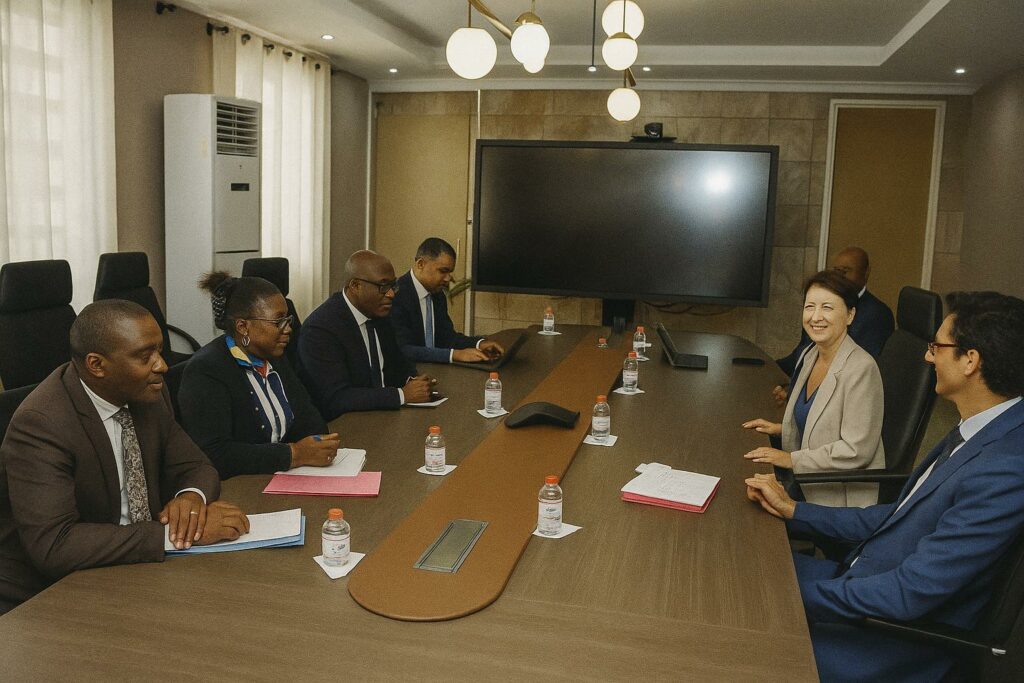A rendezvous in Brazzaville signals continuity
Diplomatic protocol rarely gives room for improvisation, yet the cordial tone that suffused the 10 July meeting between European Union Ambassador Anne Marchal and Finance Minister Christian Yoka carried a distinct sense of momentum. Their discussion, the first since the minister’s appointment, provided an opportunity to review almost six decades of cooperation inaugurated by the Yaoundé Accords in 1963 and carried forward under successive Lomé and Cotonou frameworks. According to participants, the session closed with a shared conviction that the partnership remains both politically relevant and technically robust.
Historical bedrock of EU-Congo partnership
European assistance to Congo-Brazzaville has long evolved beyond the nostalgia of post-colonial arrangements. Under the 11th European Development Fund, some €85 million were committed to road corridors linking Brazzaville to Pointe-Noire and to secondary cities such as Ouesso, thereby reinforcing national cohesion and sub-regional trade. The EU’s blending instruments meanwhile leveraged concessional loans from the African Development Bank to refurbish the Congo-Ocean Railway, a strategic spine for bulk exports. Officials in Brussels argue that these legacies provide the credibility necessary to embark on the more complex, cross-cutting ventures envisaged for the 2021-2027 programming cycle (European Commission development outlook 2023).
A financial pipeline aligned with national priorities
Minister Yoka, custodian of the Public Treasury, emphasised during the encounter that external financing must dovetail with the National Development Plan 2022-2026, a blueprint seeking to lift non-oil growth above 5 % annually. Ambassador Marchal concurred, noting that the EU’s Global Gateway can channel grants and risk-sharing mechanisms toward precisely those sectors identified by Brazzaville as catalytic: transport logistics, vocational training, and e-government services. While the monetary envelope for the new Multi-Annual Indicative Programme has yet to be finalised, insiders close to the Directorate-General for International Partnerships refer to a “steady-state” scenario of roughly €30 million per annum, supplemented by loans from the European Investment Bank.
Governance, green transition and digital leap
Forest governance remains a flagship theme, not merely for its climate resonance but also for its revenue implications. Congo’s 22 million hectares of dense forest constitute the second lung of the Congo Basin, and Brussels has funded satellite-based forest monitoring since 2008. The forthcoming EU regulation on deforestation-free products elevates the subject from environmental good practice to commercial necessity, a shift that Brazzaville appears keen to seize. In parallel, the European Union will expand its support for digital infrastructure, including a secure government cloud and civil-registry modernisation, measures expected to enhance fiscal mobilisation and public-service delivery. As Ambassador Marchal put it, “digital sovereignty and ecological stewardship are no longer parallel tracks; they reinforce each other when framed by sound public finance”.
Geostrategic reading of Brussels’s renewed zeal
Beyond development metrics, the renewed engagement reflects broader geostrategic calculations. With the Gulf of Guinea surfacing as a maritime security hotspot and rival powers courting Central African capitals, the EU is intent on demonstrating that its partnership model remains competitive, predictable and respectful of national ownership. Analysts at the European Council on Foreign Relations argue that maintaining a visible footprint in Brazzaville offers a hedge against the perception that Europe’s attention has drifted exclusively toward the Sahel or Eastern Europe. Congolese officials, for their part, stress that stability and policy consistency under President Denis Sassou Nguesso remain assets that external investors value highly.
Prospects as Brazzaville courts diversified partners
Looking ahead, the Congo’s search for diversified funding—exemplified by recent forays into green bonds and negotiations with Gulf sovereign funds—does not dilute the EU’s relevance. Rather, it introduces a healthy competitive tension that could unlock efficiency gains. The EU Delegation indicates that results-based financing, particularly in vocational education, will become the yardstick for new disbursements, aligning with the International Monetary Fund’s 2022 Extended Credit Facility and its emphasis on governance reforms. In this evolving marketplace of partnerships, Brussels’s latest pledge signals not fatigue but a readiness to innovate while honouring a historic bond. For Congo-Brazzaville, the message is equally clear: reliable allies remain indispensable as the country seeks inclusive growth in an increasingly complex geopolitical landscape.

